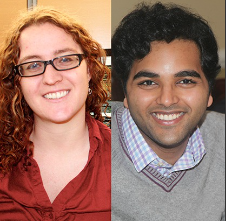
Weill Cornell Medicine doctoral candidates Kaitlyn Gayvert and Neel Madhukar have been recognized as part of Forbes magazine's "30 Under 30" list, which lauds the successes of young change agents in 20 professional fields.
Gayvert and Madhukar, both enrolled in the computational biology and medicine program at Weill Cornell Medicine, were named as two of the most emerging talents younger than 30 in healthcare nationwide. Forbes honored them for using big data algorithms to discover new anticancer drugs, predict drug targeting mechanisms, and address toxicity for existing such drugs before reaching the clinical trial stage.
Both Gayvert and Madhukar are pleasantly surprised by the Forbes honor, and are proud to know their lab work is being noticed on an international stage.
"It's nice to have recognition for your work," said Gayvert, a fourth-year doctoral student. "It truly is an honor to be named in the company of these other people who have accomplished so many great things with their work."
Gayvert's doctoral thesis advisor is Dr. Olivier Elemento, an associate professor of physiology and biophysics and of computational genomics in computational biomedicine at the HRH Prince Alwaleed Bin Talal Bin Abdulaziz Al-Saud Institute for Computational Biomedicine, and head of the computational biology group at the Caryl and Israel Englander Institute for Precision Medicine. Working with him she has developed computational tools to predict drugs that are likely to perform well in clinical trials. She aims to reduce rising clinical trial attrition rates and what she called "skyrocketing" costs, which would ultimately reduce costs for both pharmaceutical companies and, in the long run, cancer patients.
In his work in Dr. Elemento's lab, Madhukar has developed a computational method for predicting the mechanism of a drug by integrating numerous unrelated datasets. The method, called BANDIT, has also discovered new potential cancer therapeutics and could help pharmaceutical companies develop drugs more efficiently.
"It's a huge honor," said Madhukar, a third-year doctoral student, of his Forbes recognition. "Sometimes people don't think of science as cool or sexy, but it's been amazing to see how many people are excited by what we are working on."
As part of the Englander Institute for Precision Medicine, which immerses researchers with molecular biologists and clinicians alike, allowing for an encompassing view of the effect of their discoveries, Gayvert and Madhukar see how the healthcare field is adapting to the new tools they're developing.
"We've seen such approaches be successful in other biological problems. We've seen this way of looking at data work in the past," Madhukar said. "It's a great time to work on this project. Big data is there; it's just waiting to be used."
